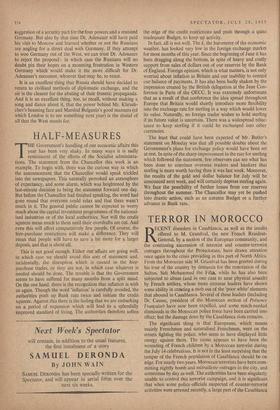HALF-MEASURES
THE Government's handling of our economic affairs this year has been very shaky. In many ways it is sadly reminiscent of the efforts of the Socialist administra- tions. The statement from the Chancellor this week is an example. To begin with, there was the curious way in which the announcement that the Chancellor would speak trickled into the newspapers. This naturally provoked an atmosphere of expectancy, and some alarm, which was heightened by the last-minute decision to bring the statement forward one day. But before the Chancellor had finished speaking, the word had gone round that everyone could relax and that there wasn't much in it. The general public cannot be expected to worry much about the capital investment programmes of the national- ised industries or of the local authorities. Nor will the credit squeeze mean much to them until their overdrafts are cut. And even this will affect comparatively few people. Of course, the hire-purchase restrictions will make a difference. They will mean that people will have to save a bit more for a larger deposit, and that is about all.
This is not good enough. Either our affairs are going well, in which case we should avoid this sort, of statement and. incidentally, the disruption which is caused in the hire- purchase trades, or they are not, in which case whatever is needed should be done. The trouble is that the Government seems to have suffered for many months from a split mind. On the one hand, there is the recognition that inflation is with us again. Though the word 'inflation' is carefully avoided, the authorities push up Bank rate twice and initiate the credit- squeeze. Against this there is the feeling that we are embarking on a period of expansion which will lead to a splendidly improved standard of living. The authorities therefore soften the edge of the credit restrictions and push through a quite inadequate Budget, to keep up activity.
In fact. all is not well. The £, the barometer of the economic weather, has looked very low in the foreign exchange market for most months of this year. Since the beginning of June it has been dragging along the bottom, in spite of heavy and costly support from sales of dollars out of our reserves by the Bank of England. Foreign opinion, which is what matters, is not only worried about inflation in Britain and our inability to control our balance of payments. It has also been badly shaken by the impression created by the British delegation at the June Con- ference in Paris of the OECC. It was extremely unfortunate that as a result of that conference the idea spread throughout Europe that Britain would shortly introduce more flexibility into the exchange rate for sterling in a way which would lower its value. Naturally, no foreign trader wishes to hold sterling if its future value is uncertain. There was a widespread reluc- tance to keep sterling if it could be exchanged into other currencies.
The least that could have been expected of Mr. Butler's statement on Monday was that all possible doubts about the Government's plans for exchange policy would have been set at rest. In spite of the sharp improvement in the rate for sterling which followed the statement, few observers can see what has been done to convince overseas traders and bankers that sterling is more worth having than it was last week. Moreover, the results of the gold and dollar balance for July will be announced next week, and will certainly depress sterling again. We face the possibility of further losses from our reserves throughout the summer. The Chancellor may yet be pushed into drastic action, such as an autumn Budget or a further advance in Bank rate.


































 Previous page
Previous page